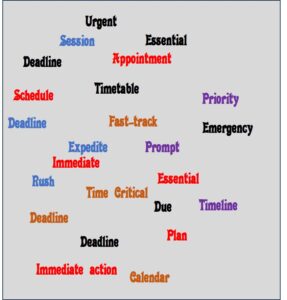Perhaps it’s my background in electronic design speaking, but I’ve always regarded time as sacrosanct. Consider this: when you’re designing a system that operates at 100 MHz, tolerating a signal that “usually” arrives on time is out of the question. Too late, or even a bit too early, and your entire system risks malfunction. Yes, I understand that humans are not circuits and require a degree of flexibility, but it genuinely frustrates me when punctuality is not taken seriously.
One of the profound reliefs of retirement is the luxury to speak my mind without the looming threat of a supervisor’s disapproval influencing my performance reviews (for the record, that never happened). This newfound freedom empowers me to explore topics previously too delicate to touch.
 Throughout my career, I was exposed to an endless parade of time-related commitments: deadlines, schedules, meetings, working hours, core hours. Yet, it perpetually mystified me how some managers demanded rigid adherence to these timelines while they themselves cavalierly dismissed them.
Throughout my career, I was exposed to an endless parade of time-related commitments: deadlines, schedules, meetings, working hours, core hours. Yet, it perpetually mystified me how some managers demanded rigid adherence to these timelines while they themselves cavalierly dismissed them.
How is anyone expected to respect management when they flagrantly ignore the very schedules they enforce? It seems almost a power play, arriving late, undermining the presenter by making them recapitulate for their benefit. They fail to grasp that this behavior reduces their proclaimed deadlines and schedules to nothing more than noise to those of us in design engineering. If they can’t show respect for our time, why should we take their deadlines seriously?
Moreover, when they earmark an hour for a meeting and the meeting consistently spills over into ninety minutes, it screams a lack of seriousness about time. How can they expect us to commit to their schedules when they so blatantly disregard their own?
I know it sounds like comparing apples to oranges, but truly, it isn’t. Whether they acknowledge it or not, they are exhibiting a total disrespect for time. And yet, they seem shocked when deadlines are missed.
I’m no fool; I always avoided broaching this during my annual reviews. However, shortly thereafter, I confronted many of my supervisors about this. Predictably, those most guilty of these infractions were also the most defensive. Not once did I receive a response that suggested a genuine understanding of my concerns.
Let me state this unequivocally: if you expect your team to take your deadlines, meeting times, working hours seriously, then you must exemplify punctuality yourself. You must demonstrate profound respect for time. While exceptions are inevitable, habitual disregard sends a clear message to every engineer: disregard everything management is saying about deadlines or timeliness.
Some managers argue that this isn’t a fair comparison. Let’s do the math. If your one-hour meeting consistently overruns by ten minutes, that ten minutes represents a 17% deviation. Missing the deadline on a two-year project by one month amounts to just over a 4% delay. Those extra ten minutes are equivalent to a four-month delay on a two-year project. And if you think your engineers aren’t crunching these numbers, you don’t truly know your team.
Exceptional managers are supposed to lead by example, yet sometimes they are blind to how their behavior is interpreted. Unfortunately, poor managers will remain poor managers and don’t care. You’re welcome to share this with your manager, though I would strongly recommend doing so either anonymously or after your performance review has safely passed.

© 2024, Byron Seastrunk. All rights reserved.










Recent Comments